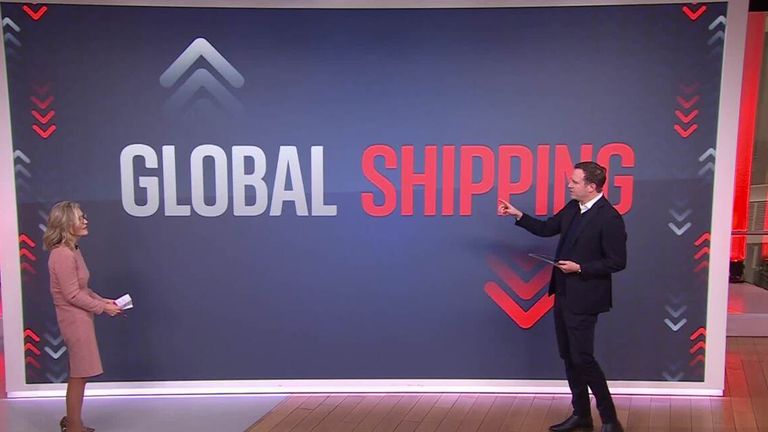Shell has refused to comment on a report that it has suspended shipments through the Red Sea amid attacks on freight by Iran-linked Houthi rebels.
The oil and gas major was said, by the Wall Street Journal (WSJ), to have taken the decision last week to avoid the short route to Europe via the Suez Canal indefinitely.
The paper, citing a number of sources, said there was concern within the company that US and UK strikes on Houthi targets in Yemen could be met with further escalation, placing crews and vessels at a greater risk.
The WSJ also reported worries that a successful attack could trigger a massive spill in the region.
Follow Middle East live: US seizes Iranian weapons bound for Houthis
Attacks on ships by the Houthis, who say they are acting in solidarity with Palestinians in Gaza, have disrupted global commerce since November last year.
Missiles have struck two vessels in the Red Sea this week despite a US-led naval operation to protect shipping.
Please use Chrome browser for a more accessible video player
0:59
‘Lights are flashing red on global dashboard’
In the latest incident, the empty Greek-owned bulk carrier MT Zografia was reportedly hit while sailing from Vietnam to Israel.
Greek shipping ministry sources told the Reuters news agency that none of the 24 crew were injured.
The Marshall Islands-flagged Gibraltar Eagle was earlier struck by a missile, causing a fire in the cargo hold.
Around 12% of global trade passes through the Red Sea and there are growing fears that an extended period of disruption is a threat to easing inflation – in Europe in particular.
Sky News reported last Friday how the cost of a container had leapt by more than 300% since November as prices took account of longer transit times and additional, crew, fuel and insurance costs.
Please use Chrome browser for a more accessible video player

5:17
How do shipping attacks hit shoppers?
Around 12% of global trade passes through the Red Sea in peacetime because it takes at least 10 days off journeys to Europe from Asia.
Read more:
Who are the Houthis?
Iran condemns US-British attacks on Yemen
The bulk of that traffic is now having to bypass the Red Sea and Suez Canal and pass around the coast of Africa instead.
Shell rival BP revealed just before Christmas that it had taken the decision to divert, along with major container shipping operators.
The consequences of the additional costs are yet to be felt by consumers but they are, according to industry figures, set to be passed on down the supply chain in the coming weeks and months.
The chief financial officer of ports and freight operator DP World, Yuvraj Narayan, told Reuters the disruption would hit European consumers hardest.
“The cost of goods into Europe from Asia will be significantly higher,” he said at the annual World Economic Forum meeting in Davos.
“European consumers will feel the pain… It will hit developed economies more than it will hit developing economies.”







